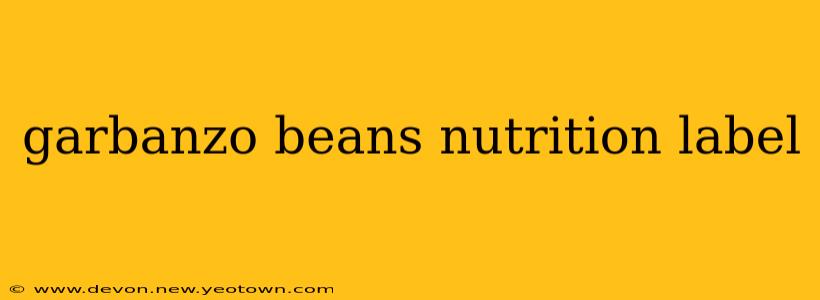Decoding the Garbanzo Bean Nutrition Label: A Nutritional Powerhouse in a Humble Package
Garbanzo beans, also known as chickpeas, are culinary chameleons. From creamy hummus to hearty stews, their versatility is undeniable. But beyond their deliciousness lies a nutritional profile that's anything but humble. Let's dive into the typical garbanzo bean nutrition label and uncover the secrets of this nutritional powerhouse.
Imagine this: You’re picking up a can of garbanzo beans at the grocery store, and your eye is drawn to the nutrition label. What are you really looking at? It's more than just numbers; it’s a window into a world of health benefits. A typical serving (around ½ cup or 120g of cooked garbanzo beans) generally boasts:
-
High in Protein: Garbanzo beans are a fantastic source of plant-based protein, essential for building and repairing tissues, and supporting overall bodily functions. This makes them a valuable addition to vegetarian and vegan diets.
-
Excellent Source of Fiber: This is where things get interesting. That hefty fiber content contributes significantly to digestive health, promoting regularity and preventing constipation. Fiber also helps regulate blood sugar levels, keeping you feeling fuller for longer and potentially aiding in weight management.
-
Rich in Minerals: The label will highlight various minerals, including iron, which is crucial for red blood cell production and preventing anemia; potassium, important for maintaining healthy blood pressure; and magnesium, vital for numerous bodily processes, including muscle and nerve function.
-
Good Source of Folate: Folate, a B vitamin, plays a critical role in cell growth and development, particularly crucial during pregnancy.
-
Packed with Vitamins: Look for vitamins like vitamin B6, important for brain development and function, and vitamin K, contributing to blood clotting and bone health.
Now, let's address some frequently asked questions surrounding garbanzo bean nutrition:
What are the health benefits of eating garbanzo beans?
The benefits go beyond simply ticking nutritional boxes. Regular consumption of garbanzo beans is associated with:
- Improved heart health: The fiber, potassium, and magnesium content contribute to maintaining healthy blood pressure and cholesterol levels, reducing the risk of heart disease.
- Better blood sugar control: The high fiber content helps regulate blood sugar, making them beneficial for individuals with diabetes or those at risk of developing it.
- Weight management: Their high fiber and protein content promote satiety, helping you feel fuller for longer and potentially aiding in weight loss or maintenance.
- Improved digestive health: The fiber content supports a healthy gut microbiome, improving digestion and preventing constipation.
Are garbanzo beans good for weight loss?
Absolutely! Their high fiber and protein content contribute to satiety, meaning you'll feel fuller for longer and likely consume fewer calories overall. They're a great addition to any weight-loss diet plan, replacing less nutritious snacks and adding volume to your meals without excessive calories.
How many garbanzo beans should I eat a day?
There's no magic number. Including garbanzo beans as a regular part of a balanced diet is key. A ½ cup serving (around 120g cooked) is a good starting point, but you can gradually increase your intake based on your individual needs and dietary preferences.
What are some creative ways to incorporate garbanzo beans into my diet?
Beyond hummus (though we love hummus!), there's a world of possibilities:
- Salads: Add them to your favorite salad for a boost of protein and fiber.
- Soups and stews: They add heartiness and texture to many soups and stews.
- Roasted chickpeas: A crispy and delicious snack.
- Falafel: A Middle Eastern delight made entirely of chickpeas.
- Flour: Garbanzo bean flour can be used in baking for a gluten-free alternative.
Ultimately, the garbanzo bean nutrition label is a testament to the power of simple, whole foods. This humble legume is a nutritional superstar, offering a plethora of health benefits. So next time you're at the grocery store, don't hesitate to add a can (or two!) to your cart. Your body will thank you for it.

